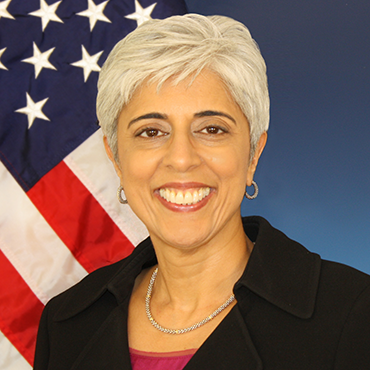DARPA targets MERS
The Defense Advanced Research Projects Agency work on Middle East Respiratory Syndrome is one of the first big tests for its nascent Biological Technologies Office.

DARPA Director Arati Prabhakar has said biological research is a critical area for her agency -- and work on Middle East Respiratory Syndrome is one of the first big tests for its nascent Biological Technologies Office.
The Defense Advanced Research Projects Agency is on the front lines of thwarting the spread of a deadly respiratory virus that has gained a foothold in the United States.
DARPA Director Arati Prabhakar said her agency is using advanced biological research to help combat the Middle East respiratory syndrome, better known as MERS. The virus first appeared in Saudi Arabia in 2012 but recently began cropping up in the U.S., with a second case reported earlier this week.
DARPA’s work on MERS is one of the first big tests for the agency’s nascent Biological Technologies Office, which consolidates the common work of biologists, neuroscientists and others. “Starting today, biology takes its place among the core sciences that represent the future of defense technology,” the agency declared in announcing the office last month.
To outpace infectious diseases like MERS, “you need very rapid, specific diagnostics and you need prophylaxes that can be fast-acting and widely distributed very quickly,” Prabhakar said May 14 at the Atlantic Council in Washington, D.C.
Her agency has funded research by Dr. Wayne Marasco that claims to have found neutralizing antibodies that can prevent part of the MERS virus from infecting human cells. “In the absence of a licensed vaccine or antiviral for MERS,” the neutralizing antibodies offer “the possibility of developing human [neutralizing antibody-based] immunotherapy, especially for health care workers,” says an abstract of a May 13 study co-authored by Marasco.
The research is part of a DARPA program called 7-Day Biodefense, which Marasco described in an interview as the Defense Department’s “attempt to have platforms in place for rapid response to emerging pathogens.” He was already doing research for that program when DARPA asked him to focus on MERS after its outbreak in 2012.
DARPA helped underwrite the discovery of the neutralizing antibodies for MERS, but bringing a related vaccine to market could take many more months, if not years, and is well beyond DARPA’s mandate. The agency “does not plan to continue development of the MERS antibodies. That is consistent with DARPA's business model; the agency nurtures new research and technology to the point of demonstrating its feasibility, then hands it off for maturation by another organization,” a DARPA public affairs official said in an email.
The agency’s funding of MERS research is part of a broader emphasis on biotechnology that is reflected in budget numbers.
Funding for DARPA’s Autonomous Diagnostics to Enable Prevention and Therapeutics program, which seeks to curb the spread of infectious diseases, more than doubled from $33.8 million in fiscal 2013 to $69.4 million the following year. DARPA’s fiscal 2015 request for the program is $63.5 million, according to the agency.
For her part, Prabhakar has made the agency’s priorities clear on Capitol Hill. “Biology is nature’s ultimate innovator, and any agency that hangs its hat on innovation would be foolish not to look to this master of networked complexity for inspiration and solutions,” she said in recent testimony before a House Armed Services subcommittee.
NEXT STORY: Why Are So Many Army and VA Contracts Protested?





